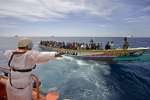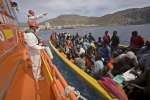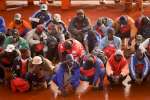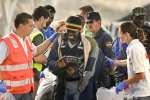Family visit flights resume in Western Sahara
Press Releases, 17 April 2014
Following many months of suspension, family visit flights under the UNHCR's Confidence Building Measures programme resumed yesterday. People from Dakhla city in Western Sahara Territory and from the refugee camps in near Tindouf, Algeria were brought together with a total of 192 people taking part in the visits.
Athar Sultan Khan, chief of staff of the UN High Commissioner for Refugees, said: "I am pleased that these flights have now resumed, enabling separated families to see each other again. I urge all the concerned parties to remain committed to this humanitarian process and UNHCR stands ready to provide support."
UNHCR's Confidence Building Measures programme for the Western Sahara refugee situation is an important humanitarian activity under its mandate. It includes cultural seminars, a programme of family visits and coordination meetings in Geneva with the two parties, Morocco and Frente Polisario, and two neighbouring countries, Algeria and Mauritania.
Nearly 20,000 people have taken part in family visits since the programme began in 2004, and more than 150 people have participated in five seminars supported by the Portuguese government. The fifth Confidence Building Measures seminar took place in the Azores, Portugal in March 2014 and the next coordination meeting will be held in Geneva in June.
Refugee families in the camps originating from Western Sahara Territory have been separated for nearly four decades because of the absence of a political solution that might end their plight. Refugees started arriving in Algeria in 1975 after Spain withdrew from the Western Sahara Territory and fighting broke out over its control.




































